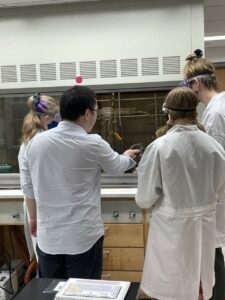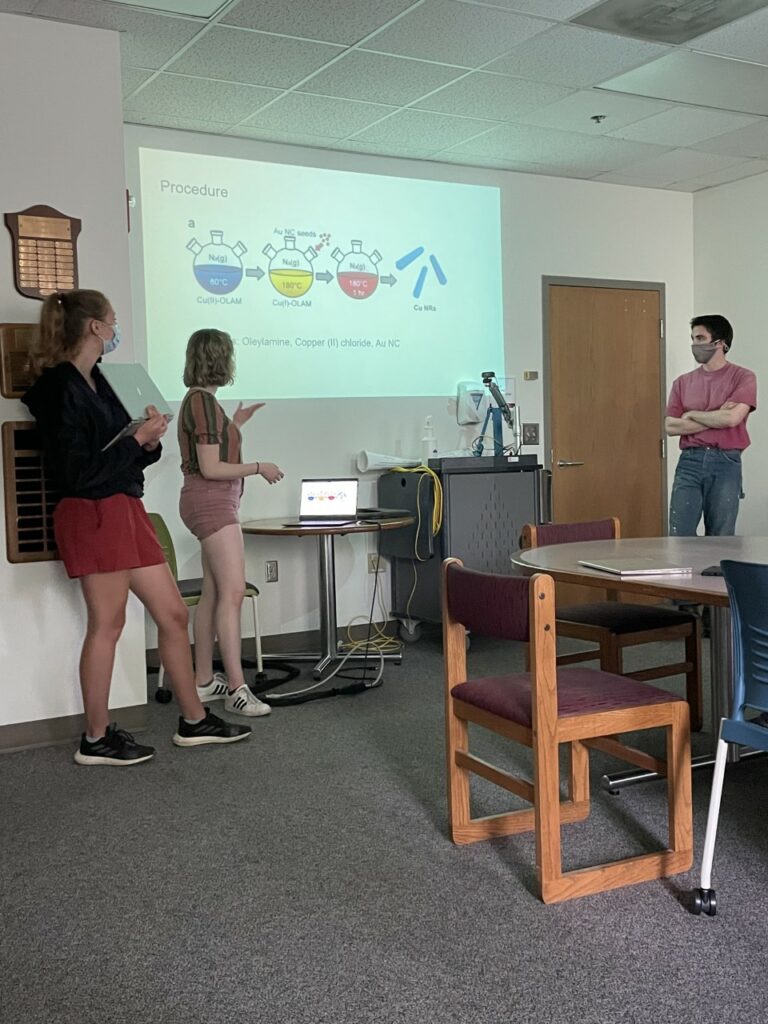Time spent working in a faculty research laboratory is a critical educational experience for many of our undergraduates. Students take C399 (Undergraduate Research) as part of their curriculum. Social distancing requirements (see 2020 article) effectively shut down in-person undergraduate research in Chemistry for the 20-21 academic year. Professor Martha Oakley suggested a program to Associate Chair Professor Charles Dann where a group of four to six students work with a faculty research group in an unused undergraduate laboratory classroom over the summer. This would provide adequate social distance for all involved while still allowing undergraduates to contribute to the research enterprise and gain valuable experience. Two of these “research pods” were created in summer 2021.
Research pods provide a valuable opportunity for undergraduates to get involved in research early in their careers with lower perceived barriers to entry compared to the traditional model. The Department created them this year in part to alleviate the large disruptions to undergraduate research experiences created by our response to the COVID-19 pandemic. The undergraduate students involved were recipients of Summer Research Fellowships; funds for materials came from the Southern Indiana Section of American Chemical Society, the College of Arts and Sciences, and the Department of Chemistry. The graduate students leading the pods were the recipients of Briscoe Fellowships. The fellowships supporting all participants are funded primarily by the generous and ongoing donations of our alumni and their families.
Students say YeSS to Materials Chemistry
Professor Xingchen Ye used this opportunity to have six undergraduate students assist in optimizing a multi-week experiment for our C427 Advanced and Nanoscale Materials Laboratory class. The program, entitled YeSS (Ye Summer Synthesis, see more pictures here), had students grow heterometallic gold/copper nanorods following procedures recently published Ye’s lab. The students worked for eight weeks under the direction of second year graduate student, Rebecca Skalla. Skalla really enjoyed working closely with a group of motivated learners. This opportunity provided her a chance to hone the teaching skills she learned as an undergrad in University of Colorado’s CU Teach program. Answering their questions about the experiments and underlying chemistry required her to dig far deeper into the relevant literature. The experience also helped her learn how to better explain difficult concepts to non-specialists in a way quite different from the typical research group meeting.
The students synthesized the nanorods in the laboratory and characterized them in bulk by UV-VIS spectrophotometry. Their work was critical in troubleshooting the procedure and optimizing any difficult steps to facilitate its use by the Fall 2021 semester’s C427 class. They learned that temperature control during seed crystal synthesis was especially crucial; they also worked out how students could accomplish this using apparatus available to C427 students. The students got to watch as transmission electron micrographs, x-ray electron dissociation spectra, and X-ray powder diffraction data were recorded by Skalla. They interpreted these datasets to determine the aspect ratios, dispersity, and microscale composition of their nanorods. At the end of the laboratory experience the students presented their results at a special Ye group meeting. Their observations and experiences will be incorporated into a manuscript currently in preparation for submission to the Journal of Chemical Education so other institutions may use this experiment in their courses.


Furthermore, the experience led junior Joe Tankersly of Indianapolis to continue his research training with the Ye group in Fall 2021. He thoroughly enjoyed the chance to work on the project collaboratively for an extended time with a group of peers. His previous lab classes had limited in-person bench time as we adapted to social distancing and COVID prevention measures in 2020. Tankersly really enjoyed learning to use a Schlenk manifold as this is an experience he had not had before.
Professor Ye hopes to host another pod in Summer 2022 to continue developing new experiments for C427 students. Xingchen believes it is critical that upper division laboratory experiments be routinely updated and revised to reflect the current state of their fields and provide the best experience for students. The YeSS students felt their experience was special because their work directly influenced the experiments performed in C427 this fall. He also hopes to develop a polymer chemistry course series (lecture and lab) to ensure our majors have an opportunity to explore this critically important subset of materials more fully.
Advanced Organic Synthesis Pod
Fourth year graduate student Jacob Desmond and second year graduate student Ryan James from the laboratory of Harry G. Day Chair and Distinguished Professor David Williams oversaw a pod of six students learning advanced synthetic organic chemistry for eight weeks. The students synthesized 500-1000 mg quantities of intermediates to be used in the convergent synthesis of pilosanone C, a natural product in the clerodane diterpene family. Students started with learning background material and then were shown several advanced lab techniques not encountered in the standard undergraduate organic laboratory sequence (J343, C344). This included utilizing air sensitive reagents and performing reactions under inert gases using Schlenk line hardware.
The students learned not only how to synthesize the intermediates, but also how to purify and characterize the products. The purification proved particularly difficult for some intermediates. Students also got to witness the recording of high resolution nuclear magnetic resonance data on their products. They then interpreted these data to confirm the structure and composition of their syntheses. The students got to contribute to a novel complete convergent synthesis of a natural product that is still in development and work through the challenges an early-career Organic Chemistry graduate student might face in the course of their studies.
Sophomore Anya Hardwick of Indianapolis was excited to have a chance to experience research at an early stage of her academic career. Hardwick described how intimidating the work seemed at the beginning as this was her first in-person organic chemistry laboratory experience (COVID-19 limited laboratory experiences in Spring 2020). However, the ability to work for long blocks of time (up to six hours per day for eight weeks) with one-on-one mentoring from graduate students enabled her to work through these initial difficulties and achieve success. Hardwick now finds S342 (Honors Organic Chemistry Lecture 2) and J343 (Organic Chemistry Lab 1 for Chemistry/Biochemistry Majors) far more approachable as she can draw from the experiences in the summer research pod. The students involved in the pod were able to forge friendships and professional ties that will serve them well going forward. Hardwick hopes to take up undergraduate research again later in her studies.
The students’ work contributed to active research in the Williams laboratory. The intermediates they synthesized have been used by graduate students to determine the approaches for later steps in the complete convergent synthesis pilosanone C and optimize the conditions of those reactions. Desmond and James enjoyed being able to show the students techniques more advanced than those performed in J343-S344. They also liked being able to mentor their undergraduates more closely than they could as an Associate Instructor in a typical lab class. This allowed the students to experience some of the passion Desmond, James, and Professor Williams have for organic synthesis. They hope the research pods can continue next summer as well.